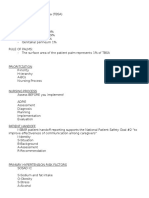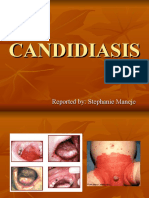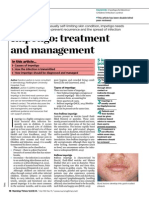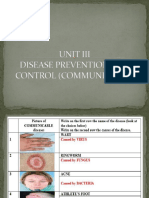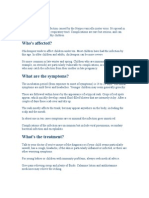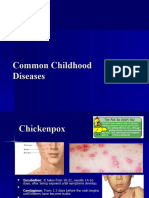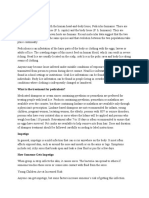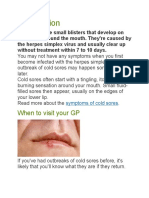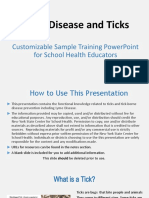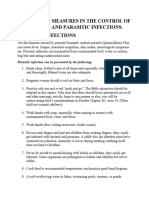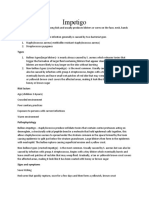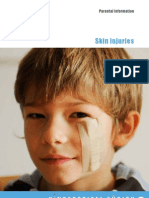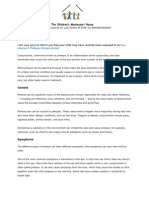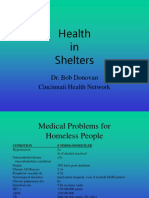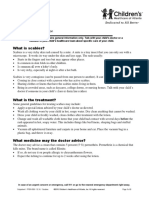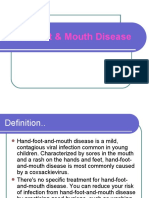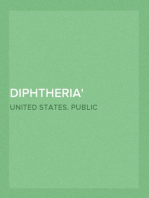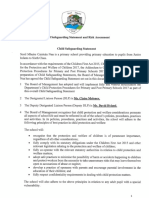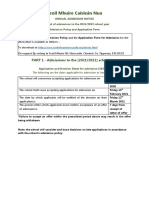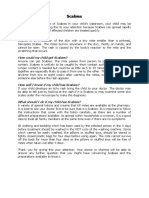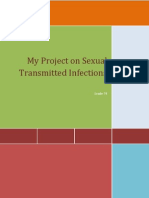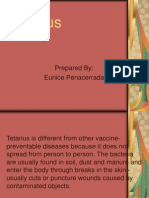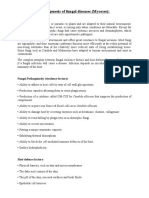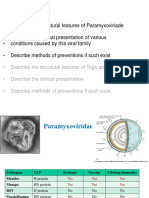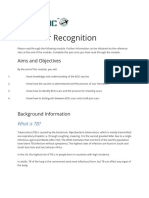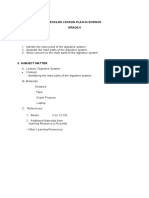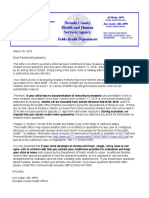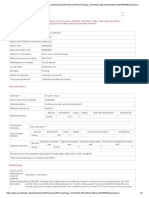Impetigo
Impetigo
Uploaded by
David HylandCopyright:
Available Formats
Impetigo
Impetigo
Uploaded by
David HylandOriginal Description:
Copyright
Available Formats
Share this document
Did you find this document useful?
Is this content inappropriate?
Copyright:
Available Formats
Impetigo
Impetigo
Uploaded by
David HylandCopyright:
Available Formats
Impetigo
Should there be a suspected case of Impetigo in your child’s school, your child may be
exposed. Although Impetigo is not usually a serious condition, it is very infectious, and if not
treated promptly, complications may occasionally occur.
What is Impetigo?
Impetigo is a bacterial infection of the skin caused by the same bacteria that commonly
cause sore throats i.e. group A streptococci, although it can also be caused by
Staphylococcus Aureus or a mixture of the two. It can cause small blisters on the skin which
break and become covered with a yellow crust. Impetigo commonly affects the hands and
face although it can spread to other parts of the body especially if the skin is broken.
Who catches Impetigo?
Anyone can catch Impetigo, but most cases occur in crowded environments e.g. in children
in schools.
How is Impetigo spread?
Impetigo is usually spread by direct contact with someone who is infected or indirectly by
sharing towels, face cloths, clothes or toys that have been used by someone who is
infected. The bacteria are present in the skin lesions. Secretions from the rash/sores are
infectious. Hands that touch the rash/sores can become contaminated and can pass the
infection to other body sites or other people.
How is Impetigo diagnosed?
Impetigo can usually be diagnosed by simply looking at it. If you suspect your child has
Impetigo, you should attend your GP for confirmation and treatment.
How is Impetigo treated?
Your GP will usually prescribe an antibiotic ointment. Sometimes, if the rash is more
extensive or is spreading rapidly, an oral antibiotic will be needed.
Should children with Impetigo be excluded from school?
Children diagnosed with Impetigo should remain out of school until the sores have stopped
blistering or crusting, or until 24 hours after starting appropriate treatment.
How can you stop the spread of Impetigo?
All cases of Impetigo should be treated appropriately and promptly.
Good personal hygiene is important in preventing infection. Children and household
members should be encouraged to wash their hands frequently especially after
touching the rash/sores or applying skin ointment. Fingernails should be kept short.
Children with Impetigo should be discouraged from touching the sores/rash to
prevent further spread.
Cuts and scratches should be kept clean and any conditions that involve broken skin,
e.g. eczema, should be treated promptly.
Towels and face cloths should not be shared.
Thank you for giving this your attention. Your doctor and local health clinic will be able to
answer any further questions you may have on impetigo.
You might also like
- Impetigo FactsheetDocument2 pagesImpetigo FactsheetReza PahleviNo ratings yet
- Chickenpox Pamphlet (Tagalog)Document3 pagesChickenpox Pamphlet (Tagalog)Ladyumi24No ratings yet
- Vaccination Schedule For HorsesDocument3 pagesVaccination Schedule For HorsesKikiNo ratings yet
- Nclex MnemonicDocument5 pagesNclex MnemonickimeligioNo ratings yet
- Impetigo: Communicable Diseases FactsheetDocument2 pagesImpetigo: Communicable Diseases FactsheethanifNo ratings yet
- ImpetigoDocument1 pageImpetigoshailesh284No ratings yet
- ImpetigoDocument3 pagesImpetigoLauraNo ratings yet
- Impetigo PDFDocument1 pageImpetigo PDFRizky RamadhanNo ratings yet
- Impetigo PDFDocument1 pageImpetigo PDFRizky RamadhanNo ratings yet
- Erbil Polythecnic University Soran Technical Insititute Midwifery Dipartment First Stage (M)Document13 pagesErbil Polythecnic University Soran Technical Insititute Midwifery Dipartment First Stage (M)Kubra ĖdrisNo ratings yet
- Erbil Polythecnic University Soran Technical Insititute Midwifery Dipartment First Stage (M)Document14 pagesErbil Polythecnic University Soran Technical Insititute Midwifery Dipartment First Stage (M)Kubra ĖdrisNo ratings yet
- Skin Disorder Impetigo - Asia KnoxDocument2 pagesSkin Disorder Impetigo - Asia Knoxapi-297616346No ratings yet
- (Impetigo) : Erbil Polythecnic University Soran Technical Insititute Nuraing Department First StageDocument14 pages(Impetigo) : Erbil Polythecnic University Soran Technical Insititute Nuraing Department First StageKubra ĖdrisNo ratings yet
- Boils Skin InfectionsDocument2 pagesBoils Skin Infectionsupasana.b.1012No ratings yet
- Impetigo: Signs and SymptomsDocument3 pagesImpetigo: Signs and Symptomspragna novaNo ratings yet
- Athletes Foot HelpsheetDocument7 pagesAthletes Foot HelpsheetAMANDA APPIAHNo ratings yet
- ImpetigoDocument3 pagesImpetigoupasana.b.1012No ratings yet
- 10 Tips To Prevent Spreading Impetigo, and Avoid Getting It AgainDocument2 pages10 Tips To Prevent Spreading Impetigo, and Avoid Getting It Againputri aisheNo ratings yet
- ImpetigoDocument1 pageImpetigocarlokim14No ratings yet
- Impetigo LeprosyDocument31 pagesImpetigo LeprosyJerlyn LopezNo ratings yet
- ImpetigoDocument7 pagesImpetigoBenjamin VanlaltlansangaNo ratings yet
- ImpetigoDocument1 pageImpetigoLim Xian NioNo ratings yet
- What Is ImpetigoDocument4 pagesWhat Is ImpetigoKate Mylhen Espenido EnerlanNo ratings yet
- 10 Common Childhood IllnessesDocument4 pages10 Common Childhood IllnessesCarel Mae CabaronNo ratings yet
- ChickenpoxDocument7 pagesChickenpoxJennevy Buque100% (1)
- Impetigo Is Caused by Bacteria, Specifically TwoDocument6 pagesImpetigo Is Caused by Bacteria, Specifically Twoivy2910324No ratings yet
- CANDIDIASISDocument20 pagesCANDIDIASISKylie GolindangNo ratings yet
- Impetigo Treatment and ManagementDocument3 pagesImpetigo Treatment and ManagementNur Ainatun NadrahNo ratings yet
- UNIT III (Health)Document47 pagesUNIT III (Health)Lyn MontebonNo ratings yet
- Main - Factsheet Pompholyx EczemaDocument3 pagesMain - Factsheet Pompholyx EczemaTatik HandayaniNo ratings yet
- ImpetigoDocument10 pagesImpetigorodentNo ratings yet
- ImpetigoDocument13 pagesImpetigoTasya SyafhiraNo ratings yet
- ChickenpoxDocument2 pagesChickenpoxShiv7_som784No ratings yet
- Childhood Diseaases 21Document18 pagesChildhood Diseaases 21CHONANo ratings yet
- Common Health Problems School AgeDocument2 pagesCommon Health Problems School Age2BGrp3Plaza, Anna MaeNo ratings yet
- Enterovirus 68 LetterDocument1 pageEnterovirus 68 Letterapi-194689198No ratings yet
- When To Visit Your GPDocument12 pagesWhen To Visit Your GPJohn EsquivelNo ratings yet
- Educators Lyme Disease and TicksDocument10 pagesEducators Lyme Disease and TicksRICHARD RODERICK OLMEDONo ratings yet
- Preventive Measures in The Control of Mycotic and Parasitic InfectionsDocument4 pagesPreventive Measures in The Control of Mycotic and Parasitic InfectionsGoodchance NgowiNo ratings yet
- Infection Control Child CareDocument1 pageInfection Control Child CareteddwosNo ratings yet
- Lesson: Lagonoy High School Quarter 3 Module 3Document3 pagesLesson: Lagonoy High School Quarter 3 Module 3John Mark PrestozaNo ratings yet
- Epidemiology: Aureus and GABHS 10% of The Time. Methicillin-Resistant S Aureus (MRSA) HasDocument8 pagesEpidemiology: Aureus and GABHS 10% of The Time. Methicillin-Resistant S Aureus (MRSA) HasPutra YdpaNo ratings yet
- ImpetigoDocument2 pagesImpetigoAMOS MELINo ratings yet
- Appendix 8 Sample Notification Letters To ParentsDocument12 pagesAppendix 8 Sample Notification Letters To ParentsEdward AkumNo ratings yet
- ChickenpoxDocument4 pagesChickenpoxJen Vizcarra CaminoNo ratings yet
- Common Illnesses and Diseases of School-Aged ChildrenDocument2 pagesCommon Illnesses and Diseases of School-Aged ChildrenKnucasior BichNo ratings yet
- Skin Injuries: Parental InformationDocument4 pagesSkin Injuries: Parental InformationewetNo ratings yet
- Conjunctivitis - PinkeyeDocument3 pagesConjunctivitis - PinkeyeJenna HenryNo ratings yet
- Health in Shelters: Dr. Bob Donovan Cincinnati Health NetworkDocument47 pagesHealth in Shelters: Dr. Bob Donovan Cincinnati Health NetworkIda Bagus Udayana KramasanjayaNo ratings yet
- ScabiesDocument2 pagesScabiesKamran AlizadaNo ratings yet
- For Finals PEDocument6 pagesFor Finals PEAvery S. BaltazarNo ratings yet
- Animal Bites Everything YouDocument5 pagesAnimal Bites Everything YounbcdserNo ratings yet
- Fungal InfectionsDocument2 pagesFungal Infectionsgaming.jan.2009No ratings yet
- Impetigo, A Simple Guide To The Condition, Diagnosis, Treatment And Related ConditionsFrom EverandImpetigo, A Simple Guide To The Condition, Diagnosis, Treatment And Related ConditionsRating: 5 out of 5 stars5/5 (3)
- Hand Foot & Mouth DiseaseDocument23 pagesHand Foot & Mouth DiseaseKabang Moa100% (1)
- LDH Monkeypox Patient Handout Awaiting Test ResultsDocument2 pagesLDH Monkeypox Patient Handout Awaiting Test ResultsdhikaverianNo ratings yet
- ResearchDocument7 pagesResearchapi-306057855No ratings yet
- Pedoman Ims2011Document1 pagePedoman Ims2011Wahyuni SetiawatiNo ratings yet
- ImpetigoDocument3 pagesImpetigoKhimiana SalazarNo ratings yet
- Hand Foot MouthDocument2 pagesHand Foot MouthBimantoro SaputroNo ratings yet
- Scabies GuidelineJanuary 2013Document13 pagesScabies GuidelineJanuary 2013anisarahma718No ratings yet
- Diphtheria how to recognize the disease, how to keep from catching it, how to treat those who do catch itFrom EverandDiphtheria how to recognize the disease, how to keep from catching it, how to treat those who do catch itNo ratings yet
- Covid Response PlanDocument33 pagesCovid Response PlanDavid HylandNo ratings yet
- Child Protection Safeguarding Statement and Risk AssessmentDocument6 pagesChild Protection Safeguarding Statement and Risk AssessmentDavid HylandNo ratings yet
- Admissions Policy Scoil Mhuire NSDocument39 pagesAdmissions Policy Scoil Mhuire NSDavid HylandNo ratings yet
- Scoil Mhuire Caisleán Nua: PART 1 - Admissions To The (2021/2022) School YearDocument3 pagesScoil Mhuire Caisleán Nua: PART 1 - Admissions To The (2021/2022) School YearDavid HylandNo ratings yet
- Book Rental Letter To ParentsDocument2 pagesBook Rental Letter To ParentsDavid HylandNo ratings yet
- Scarlet FeverDocument1 pageScarlet FeverDavid HylandNo ratings yet
- Viral MeningitisDocument1 pageViral MeningitisDavid HylandNo ratings yet
- ThreadwormsDocument1 pageThreadwormsDavid HylandNo ratings yet
- MeaslesDocument1 pageMeaslesDavid HylandNo ratings yet
- Winter Vomiting DiseaseDocument1 pageWinter Vomiting DiseaseDavid HylandNo ratings yet
- MumpsDocument1 pageMumpsDavid HylandNo ratings yet
- Strep ThroatDocument1 pageStrep ThroatDavid HylandNo ratings yet
- Whooping CoughDocument1 pageWhooping CoughDavid HylandNo ratings yet
- RubellaDocument1 pageRubellaDavid HylandNo ratings yet
- ScabiesDocument1 pageScabiesDavid HylandNo ratings yet
- Slapped Cheek SyndromeDocument1 pageSlapped Cheek SyndromeDavid HylandNo ratings yet
- RingwormDocument1 pageRingwormDavid HylandNo ratings yet
- Head LiceDocument1 pageHead LiceDavid HylandNo ratings yet
- ChickenpoxDocument1 pageChickenpoxDavid HylandNo ratings yet
- Bacterial MeningitisDocument1 pageBacterial MeningitisDavid HylandNo ratings yet
- Hand Foot and Mouth DiseaseDocument1 pageHand Foot and Mouth DiseaseDavid HylandNo ratings yet
- Measles (Campak, Rubeola, Gabak, Kerumut)Document20 pagesMeasles (Campak, Rubeola, Gabak, Kerumut)Ami UtamiatiNo ratings yet
- Nama: Nurul Aida Fauziah Pathophysiology of HIVDocument2 pagesNama: Nurul Aida Fauziah Pathophysiology of HIVDien FitriaNo ratings yet
- SodaPDF-converted-PANA LA PAGINA 436 High-Quality, High-Volume Spay and NeuterDocument860 pagesSodaPDF-converted-PANA LA PAGINA 436 High-Quality, High-Volume Spay and NeuterAndreea MayaNo ratings yet
- Agrami 2018Document8 pagesAgrami 2018Kashif Aziz AwanNo ratings yet
- History of Animal Transportation As Goods Including Police Army CAPF Without 5 FreedomsDocument56 pagesHistory of Animal Transportation As Goods Including Police Army CAPF Without 5 FreedomsNaresh KadyanNo ratings yet
- PSmarkup - Revisi 1 TeshalonicaDocument28 pagesPSmarkup - Revisi 1 TeshalonicaBrian TonioNo ratings yet
- Pictures of Six Sexual Transmitted InfectionDocument6 pagesPictures of Six Sexual Transmitted InfectionDavia ColmanNo ratings yet
- Dutch CheeseDocument3 pagesDutch Cheesegvanca miminoshviliNo ratings yet
- TetanusDocument18 pagesTetanusMichael EatonNo ratings yet
- 31 PDFDocument110 pages31 PDFsamuel mulatuNo ratings yet
- Pathogenesis of Fungal Diseases (Mycoses) :: Fungal Pathogenicity (Virulence Factors)Document8 pagesPathogenesis of Fungal Diseases (Mycoses) :: Fungal Pathogenicity (Virulence Factors)Elena ShresthaNo ratings yet
- Emerging and Reemerging Diseases - Programs and Policies On Communicable DiseasesDocument34 pagesEmerging and Reemerging Diseases - Programs and Policies On Communicable DiseasesTim Dequillo100% (1)
- Ethnoveterinary MedicineDocument10 pagesEthnoveterinary MedicineIsaac ChabataNo ratings yet
- The Proposed Veterinary Practice Bill 201X (2 Draft)Document110 pagesThe Proposed Veterinary Practice Bill 201X (2 Draft)郑雪儿No ratings yet
- Scholarship Application Motivation Letter ExampleDocument2 pagesScholarship Application Motivation Letter ExampleColo100% (1)
- Reticuloendotheliosis in ChickensDocument4 pagesReticuloendotheliosis in ChickensShah NawazNo ratings yet
- CestodesDocument83 pagesCestodesveralynn2011No ratings yet
- ParamyxoviridaeDocument27 pagesParamyxoviridaeFarrah BenoitNo ratings yet
- Skills Netbook PDFDocument95 pagesSkills Netbook PDFPhilip100% (1)
- BCG Scar RecognitionDocument17 pagesBCG Scar RecognitionAlinaCioroiu0% (1)
- Report About LucyDocument65 pagesReport About LucyABNo ratings yet
- Rcvs Accredited Quals List Fe April 2019 2Document26 pagesRcvs Accredited Quals List Fe April 2019 2Yusaku GamingNo ratings yet
- Campak Dan RubelaDocument9 pagesCampak Dan RubelaAstin Nur FitriaNo ratings yet
- Part B 33 Pandemic FluDocument6 pagesPart B 33 Pandemic FluLeah ValenciaNo ratings yet
- DETAILED LESSON PLAN IN SCIENCE. Digestive SystemdocxDocument10 pagesDETAILED LESSON PLAN IN SCIENCE. Digestive SystemdocxMark MalolesNo ratings yet
- 03 28 16 YRC Exclusion Letter 3Document1 page03 28 16 YRC Exclusion Letter 3The UnionNo ratings yet
- Telaah Jurnal Pico: Tugas Mata Kuliah Natural Advanced Therapy (NAT)Document23 pagesTelaah Jurnal Pico: Tugas Mata Kuliah Natural Advanced Therapy (NAT)Zayyan SyahrialNo ratings yet
- Bluetongue, Romania: Print CloseDocument2 pagesBluetongue, Romania: Print CloseAnna Maria MurariuNo ratings yet



